Construction Enterprise Resource Planning (ERP) software provides complete project visibility, remarkable user experiences, and a best-in-class user interface. These tools provide seamless data movement between applications, allowing you to track sales at all levels. In fact, 93% of companies that have successfully deployed an ERP system report improvements in some or all of their business processes.
This article will review the top 11 construction ERP systems of 2024 and provide insight into their benefits and challenges for the construction industry.
Let us build your first business application for free. Go from an idea to an application in under 2 weeks.
We'll buid your first application for you. At no extra cost.

What is Construction ERP Software?
Construction ERP (Enterprise Resource Planning) software is a specialized integrated management solution designed to streamline and automate various business processes within the construction industry. It encompasses functionalities such as project management, accounting, procurement, human resources, and inventory control, providing real-time data and analytics to enhance decision-making, improve efficiency, and ensure projects are completed on time and within budget.
Benefits of ERP Systems for the Construction Industry
The benefits of ERP systems are manifold, allowing construction firms the control, flexibility, and foresight they need to deliver projects on time and within budget. Some of the key benefits include:
Organization of Chaos
Managing multiple facets of a construction company at once can be extremely challenging. ERP systems centralize business information, including financial documents, contracts, permits, and more, making it easier to keep track of inventory, contractor tracking, risk assessment, and more.
Increased Productivity
ERP systems come powered with AI and ML-powered analytics that automate processes and produce insights that might otherwise go undetected. This leads to increased productivity within the organization and allows companies to work smarter, not harder.
Improved Bidding Process
Planning is inextricable from success in the construction industry. Poorly planned projects often lead to poor outcomes. Construction ERPs provide companies with tools for quickly and accurately estimating costs associated with design, labor, materials, equipment, and more, ensuring the bidding process is efficient and effective.
Real-time Insights
One of the most significant benefits of ERP software in the construction industry is the ability to provide real-time insights. Managers can track work progress, update schedules, and make necessary modifications, all in real-time.
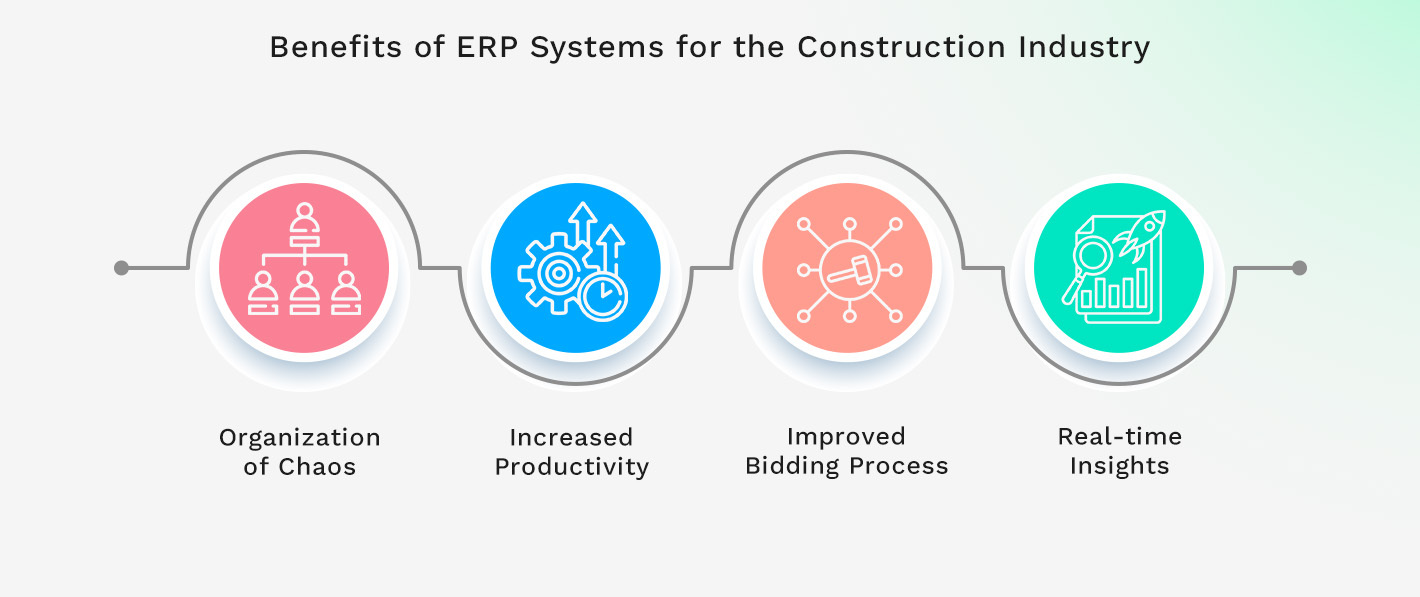
Decoding the Challenges in the Construction Industry
Construction ERP systems are designed to solve a host of intricate challenges that the construction industry faces. Here are some of the primary issues that ERP solutions address:
Inefficient Processes
From bidding to construction to the final walk-through, many construction companies still use outdated processes that waste their time and resources. ERPs replace these with automated, streamlined systems that can significantly increase efficiency.
Budget Overruns
Budgeting in the construction industry is often complex and unpredictable. ERP software provides accurate, real-time financial data that enables firms to monitor their spending closely and prevent budget overruns.
Communication Breakdowns
Communication delays or breakdowns between different teams can lead to costly errors or delays. ERP systems offer real-time collaboration tools and a unified platform where everyone stays aligned and informed.
Inaccurate Tracking
Manually tracking labor, equipment, materials, and subcontractors often results in inaccuracies. ERP systems provide precise tracking tools, leading to more reliable and accurate project outcomes.
Compliance Issues
Construction businesses must navigate various regulations and compliance demands. An ERP system's built-in functionality ensures compliance across different jurisdictions.
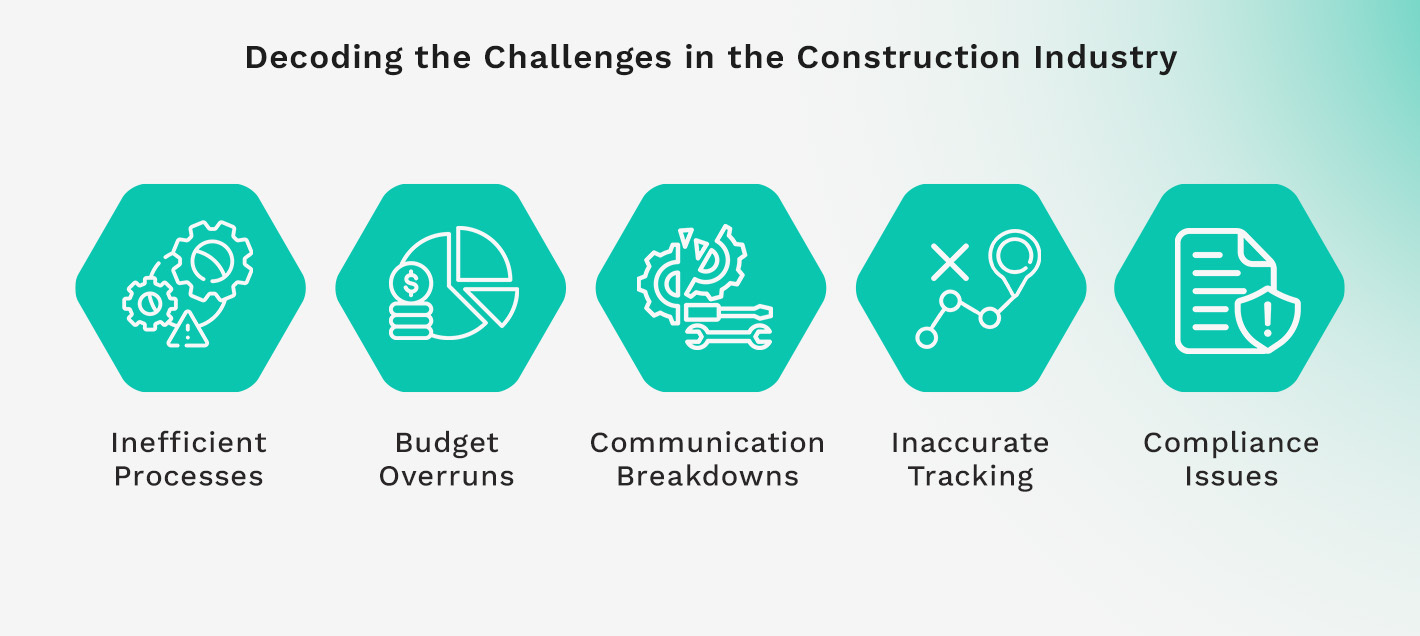
Top 11 Construction ERP Systems
Choosing the right ERP system is crucial for the success of any construction business. Here are the top 11 construction ERP systems available in 2024.
1. Kohezion
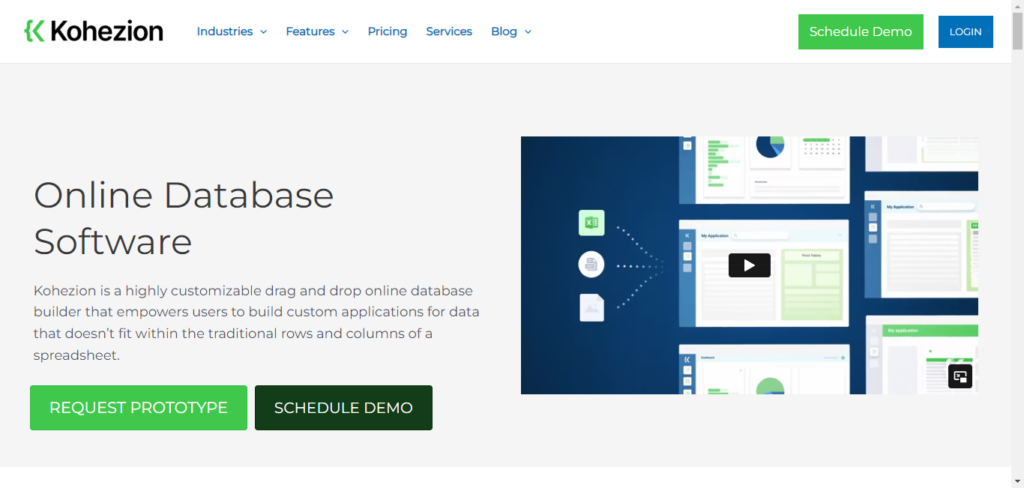
Kohezion offers a flexible online database that easily caters to construction management needs. With its no-code platform, users can create custom applications without programming knowledge, ensuring you can tailor the system specifically for your project management needs.
Top 5 Features:
- No-code application development
- Customizable project tracking
- Flexible data management
- Scalable to project size
- Secure cloud storage
Benefits:
- Reduces time spent on training with its easy-to-use interface
- Improves the efficiency of project monitoring and management
- Adapts to your project's unique requirements without the need for external IT support
- Saves costs by offering a scalable solution that fits various project sizes
- Guarantees data security with robust cloud storage options
Cons:
- May lack specialized features for certain construction processes
- Could be challenging for users seeking advanced programming capabilities
Best For: Smaller construction firms or individual contractors looking for a simple, customizable, and scalable solution to manage projects.
2. Procore
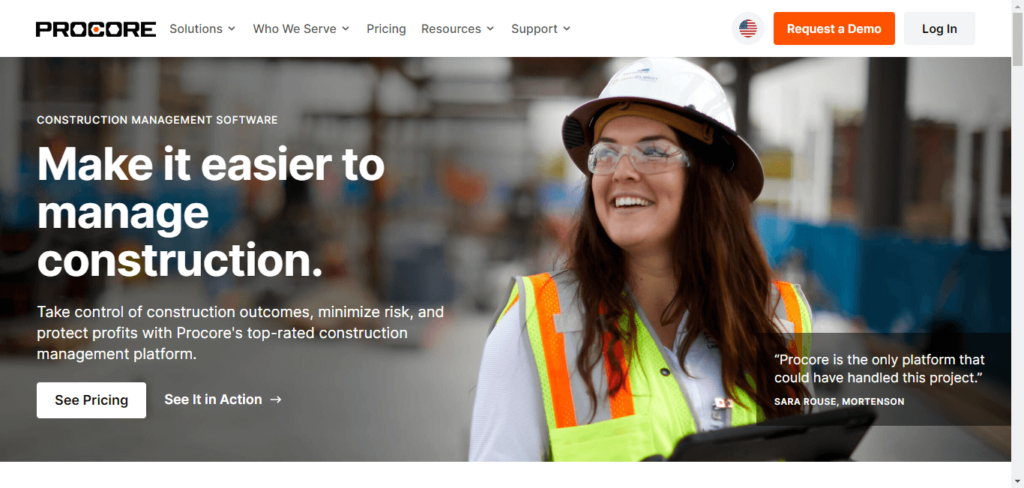
Procore Technologies is a robust construction management platform, especially for its ability to centralize data and streamline communication. With a high rating across major review sites, users appreciate Procore's comprehensive toolset, which caters specifically to the construction industry.
Top 5 Features:
- Real-time data and collaboration
- Cloud-based accessibility
- Extensive integration capabilities
- Project management from planning to delivery
- Quality and safety management
Benefits:
- Improves project efficiency through live collaboration and centralization of information
- Offers flexibility with cloud-based access to project details for all stakeholders
- Supports seamless workflows with hundreds of possible integrations
- Provides actionable insights with real-time data from a centralized dashboard
- Ensures industry-standard quality and safety measures are met
Cons:
- Mainly US-based, potentially less tailored for international markets
- Price quotes are not readily available; requires contact for a personalized quote
Best For: Business owners, general and specialty contractors across the US market looking for an all-encompassing ERP solution to manage various construction processes.
3. Viewpoint ERP
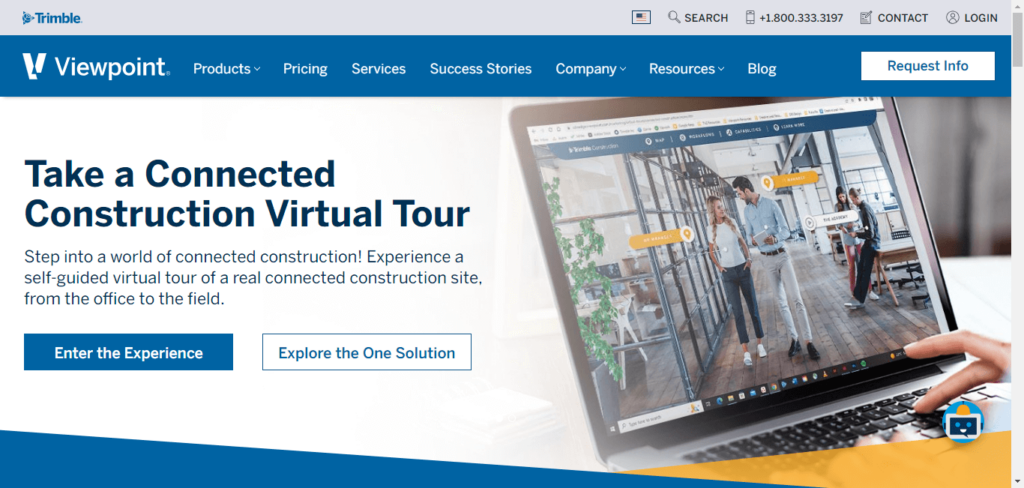
Viewpoint ERP shines as a comprehensive construction accounting system. It is part of Trimble's suite and designed for the modern construction business. Its cloud-based architecture, integration with various construction sectors, and compatibility with Trimble tools set it apart from others.
Top 5 Features:
- Extensive module range for different construction sectors
- Smooth integration with Trimble's hardware, like GPS systems
- Robust project management and field-specific tools
- Cloud-based for any time, anywhere access
- Advanced reporting and analytics
Benefits:
- Offers versatility with tailored modules for various construction sectors
- improves precision and productivity with integrated Trimble hardware
- Streamlines project execution from start to finish
- Elevates mobility with a cloud-based system, improving collaboration among teams
- Delivers keen insights on project performance and financial health with analytics
Cons:
- May have a steeper learning curve due to its extensive features
- Potentially higher cost of ownership when adding multiple modules and integrations
Best For: Construction companies of varying types and sizes, particularly those already using or planning to use Trimble's robust set of instruments and tools.
4. Sage

Sage 300 Construction and Real Estate is a comprehensive and versatile ERP solution that manages all construction and real estate project facets. Its ability to handle vast amounts of financial data and streamline operations makes it a trusted choice for industry professionals.
Top 5 Features:
- Project management across the entire lifecycle
- Strong accounting and financial modules
- Cloud-based integration for easy access
- Robust document management capabilities
- Advanced reporting and analytics for informed decision-making
Benefits:
- Offers complete oversight of project life cycles, enhancing project control
- Streamlines accounting processes, optimizing cash flow management
- Improves accessibility and collaboration with cloud-based capabilities
- Facilitates document handling, ensuring vital documentation is organized and easily retrievable
- Provides powerful business insights with data analytics for strategic planning
Cons:
- May be cost-prohibitive for smaller companies
- The wide range of features could result in a longer learning curve for new users
Best For: Mid to large-size construction firms and real estate managers seeking an ERP solution that offers comprehensive financial management and project oversight.
5. CMiC
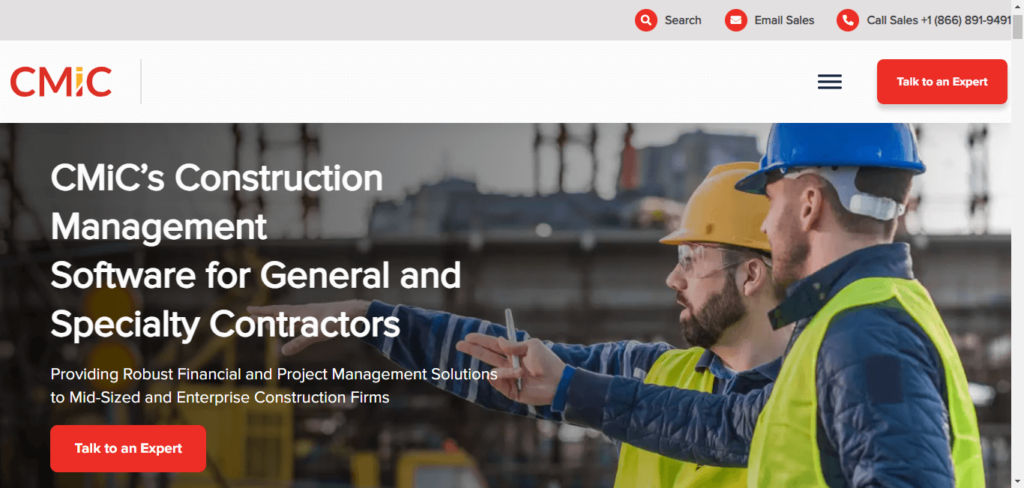
CMiC CMiC ERP targets the unique demands of construction businesses by providing a specialized and comprehensive management platform. It is tailored to handle complex projects while offering solutions to mitigate challenges faced in smaller ones. This construction-centric ERP system is praised for automating daily tasks and seamless integrations.
Top 5 Features:
- Budgeting, forecasting, and change order management
- Document management for streamlined workflows
- Procurement and bidding tools integrated into the system
- Business Intelligence for data-driven insights
- Flexible deployment options, including on-premises or cloud-based solutions
Benefits:
- Facilitates better financial control through advanced budgeting and forecasting features
- Improves document access and control, enhancing project communication
- Streamlines the procurement process, right from bidding to awarding contracts
- Offers actionable insights with business intelligence, aiding strategic decisions
- Meets a business's specific requirements with customizable deployment models
Cons:
- The intricate feature set might require thorough training
- Initially developed for the US market, some solutions may not fully align with UK construction industry standards
Best For: Larger construction firms or those with complex project management needs that require a detailed and integrated approach to resource planning and project execution.
6. Buildertrend
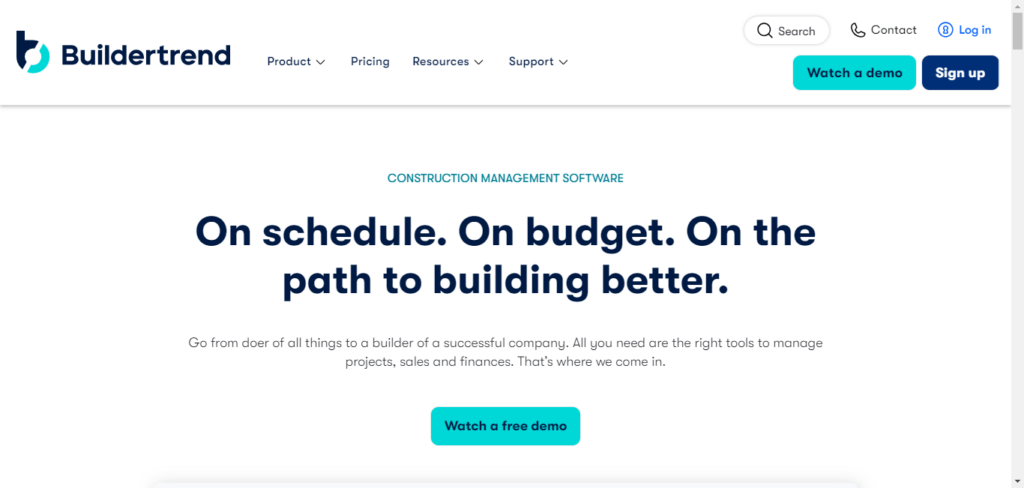
Buildertrend combines ease of use with a comprehensive suite of features tailor-made for home builders, remodelers, and contractors. Recognized for streamlining pre-sales, project management, and customer management processes, it boasts a mobile app that ensures you're never out of touch with your project's details.
Top 5 Features:
- Pre-sales features, including bid requests and lead management
- Project management tools such as time clocks and to-do lists
- Comprehensive financial management with budgeting and invoicing
- Client relationship management to improve customer satisfaction
- Mobile app availability for on-the-go management
Benefits:
- Simplifies the lead acquisition and bidding process, increasing potential business opportunities
- Maintains project organization and time management with daily logs and schedules
- Manages financials efficiently with features for budgets, invoicing, and lien waivers
- Improves client communication and service, fostering stronger relationships
- Offers convenience and accessibility through its iOS and Android mobile applications
Cons:
- May have a learning curve for newcomers to construction ERP systems
- Could require additional costs for full access to all features, which may be restrictive for smaller businesses
Best For: Builders and contractors seeking an ERP that’s as mobile as they are, aiming to manage their business from lead to completion with centralized tools.
7. Epicor Construction

Epicor Construction and Engineering is a distinguished ERP solution crafted for the construction industry. It offers a robust range of features that cater to contractors and builders. Its adaptability, enabling both on-premises and cloud deployments, allows organizations to tailor the system to their specific needs, optimizing their business processes.
Top 5 Features:
- Project and asset management for tracking resources and timelines
- Inventory and labor management to ensure efficiency and cost-effectiveness
- Resource scheduling and contract management for better project coordination
- Seamless integration capabilities with existing IT infrastructure
- Financial management, from project estimation to budget planning
Benefits:
- Simplifies project delivery by providing comprehensive oversight of all assets
- Promotes labor productivity and cost control through intelligent management features
- Facilitates smooth project execution with effective scheduling and contract handling
- Assures ease of use with seamless integration into current systems
- Assists in achieving financial objectives with detailed estimation and budgeting tools
Cons:
- The rich feature set could be overwhelming for smaller organizations
- May incur extra costs for deployment and maintenance if not managed correctly
Best For: Construction and engineering companies needing a versatile ERP solution with strong integration capabilities that accommodate a spectrum of EPC company sizes and requirements.
8. PlanGrid

PlanGrid, now part of Autodesk Construction Cloud, stands as a valuable tool for those in the construction space, and it is celebrated for its user-friendly interface and adeptness in document management. The ability to access, update, and share blueprints and documents makes it a favorite among field teams.
Top 5 Features:
- Real-time blueprint updates and synchronization
- Advanced document control, including versioning and archiving
- Intuitive markup and collaboration tools
- Field report templates and progress tracking
- Integration capabilities with Autodesk products and beyond
Benefits:
- Improves team efficiency by allowing instant blueprint access and updates
- Minimizes errors with superior document management features
- Supports teamwork and clarity through easy markup tools
- Streamlines field reporting with customizable templates
- Provides a centralized system compatible with various other construction software solutions
Cons:
- Higher-tier pricing can be a barrier for small firms
- With a focus on documentation, it might lack other ERP features, such as advanced financials
Best For: Busy construction professionals who require a robust document management system that is mobile-friendly and can effortlessly scale to meet the demands of large-scale projects.
9. Penta Technologies
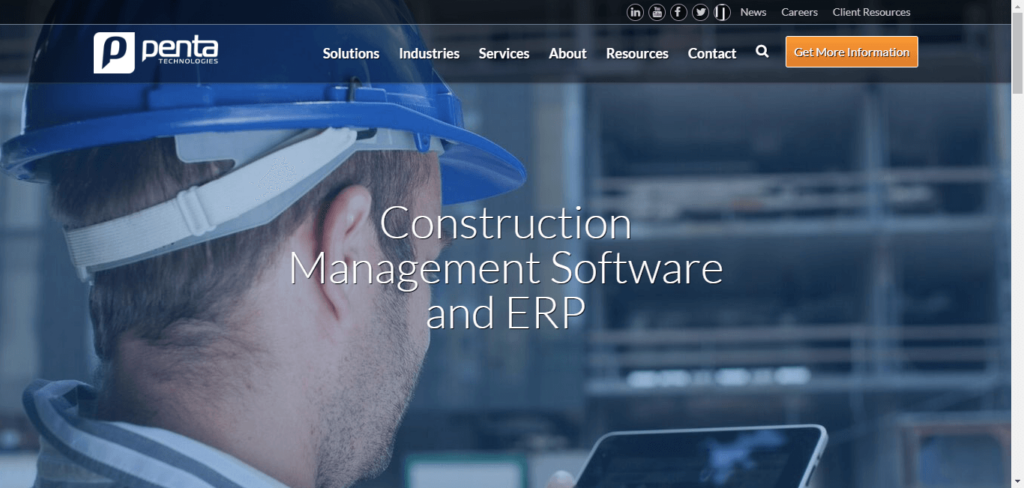
Penta Technologies stands out for its capabilities in managing complex accounting, analytics, and project oversight. With flexible deployment options, businesses in the construction sector can tailor the framework to fulfill the unique demands of their operations, ensuring precision and control.
Top 5 Features:
- Project management and field service optimization
- In-depth accounting and financial management
- Sophisticated business intelligence and analytics
- Equipment management and tracking
- Both on-premise and cloud-based deployment models
Benefits:
- Empowers users to manage and coordinate all field service-related activities
- Streamlines accounting tasks with robust financial management tools
- Delivers actionable insights through advanced business intelligence features
- Improves the management and performance of construction equipment
- Offers deployment flexibility congruent with the needs of your business
Cons:
- Could have a steeper learning curve due to the intricate feature set
- The system's comprehensiveness may require a larger upfront investment in training and setup
Best For: Design, engineering, and construction businesses that need a powerful enterprise system to manage complex projects, finances, and equipment efficiently.
10. Acumatica

Acumatica is a highly-rated ERP tailored for both residential and commercial construction. Its cloud-based platform harmonizes project management, financials, and operations, empowering users to keep projects on track and grow their business. Acumatica's real-time data and accessibility via mobile devices ensure that managers and teams always have the latest project updates at their fingertips.
Top 5 Features:
- Unified project management for streamlined processes
- Robust financial reporting and construction accounting
- Real-time visibility into project status with mobile access
- Integrated payroll, inventory management, and compliance capabilities
- Customer relationship management integrated within the core system
Benefits:
- Aligns all stakeholders with constant access to project data and updates
- Streamlines financial operations, enhancing cost tracking and profitability analysis
- Facilitates on-site decision-making with essential data available on mobile devices
- Combines various facets of operations, such as payroll and inventory, for efficiency
- Supports customer engagement and satisfaction through integrated CRM features
Cons:
- Can be overwhelming for smaller construction companies due to its extensive features
- May require additional training, given its rich and specialized functionality
Best For: Medium to large construction companies that need a comprehensive, mobile-friendly ERP solution to integrate all their processes and are looking to scale efficiently.
11. Vista ERP
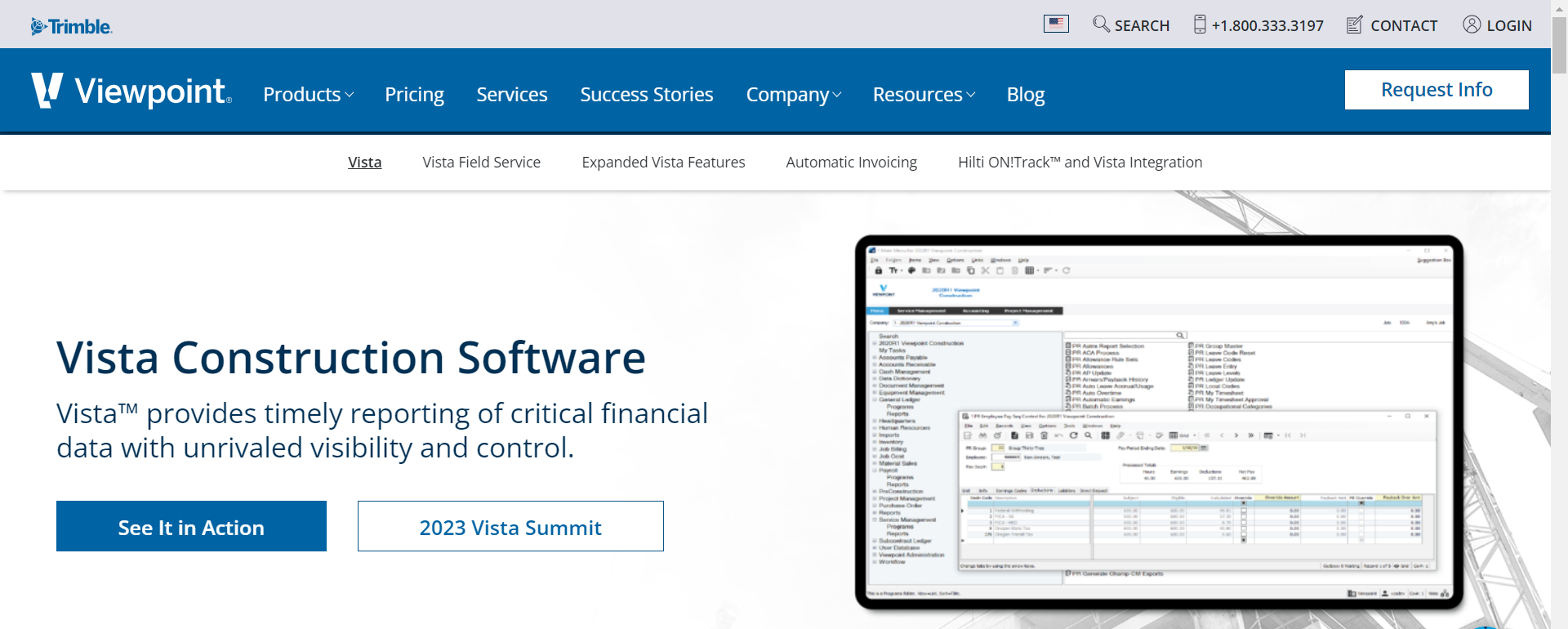
Vista ERP carves a niche for itself as an intuitive and comprehensive ERP system for robust project management. Its integration with accounting and deep industry-specific functionalities ensures businesses can keep their projects within budget and time while maintaining profitability and operational efficiency.
Top 5 Features:
- Deep integration between accounting and project management modules
- Detailed revenue and cost management tools
- Fully adaptable to the UK construction industry standards
- Over 100,000 users in the UK, showcasing reliability and scalability
- Human Resource Management for syncing workforce data with project needs
Benefits:
- Ensures financial control and project monitoring are interlinked for better budget adherence
- Provides valuable insights into project finances, preventing cost overruns
- Catered to local industry requirements, making it an optimal choice for UK companies
- Demonstrated scalability and durability across many users, ensuring dependability
- Integrates HR processes, connecting personnel performance with project outcomes
Cons:
- Geared more towards the UK market, which may limit its features in other regions
- Larger user base implies a need for regular updates and possible extended customer service waiting times
Best For: Large UK-based construction firms looking for ERP software with proven reliability and a suite of features that accommodate complex construction processes.
Features to Look for in Construction ERP Software
When choosing a construction ERP, there are several core features to consider as they offer maximum value to your business:
Project Management Module
The Project Management Module in Construction ERP software streamlines project planning, scheduling, and execution. It enables efficient resource allocation, progress tracking, and collaboration among team members. With real-time updates and reporting tools, it ensures projects are completed on time and within budget, enhancing overall project efficiency and productivity.
Accounting and Financial Management
The Accounting and Financial Management feature provides comprehensive tools for managing all financial aspects of construction projects. This includes budgeting, forecasting, expense tracking, and financial reporting. It ensures accurate financial records, compliance with accounting standards, and offers insights into financial health, helping businesses make informed decisions and maintain profitability.
Inventory Management
The Inventory Management module helps construction companies effectively track and manage materials, equipment, and supplies. It provides real-time visibility into inventory levels, automates reordering processes, and reduces waste and shortages. This feature ensures that the right materials are available when needed, minimizing project delays and optimizing resource utilization.
Document Management
The Document Management feature centralizes the storage, organization, and sharing of all project-related documents. It supports version control, secure access, and easy retrieval of blueprints, contracts, permits, and other critical documents. This enhances collaboration, ensures compliance with regulatory requirements, and reduces the risk of document loss or mismanagement.
Compliance and Risk Management
Compliance and Risk Management tools help construction companies identify, assess, and mitigate potential risks and ensure adherence to industry regulations and standards. It includes features for tracking safety protocols, managing insurance and permits, and conducting regular audits. This module helps minimize legal liabilities, improve safety, and maintain project integrity.
Bid Management
The Bid Management module streamlines the process of creating, submitting, and tracking bids for construction projects. It helps contractors generate accurate estimates, manage subcontractor bids, and monitor bid statuses. This feature automates and organizes bid-related activities, which enhances the efficiency and success rate of securing new projects.
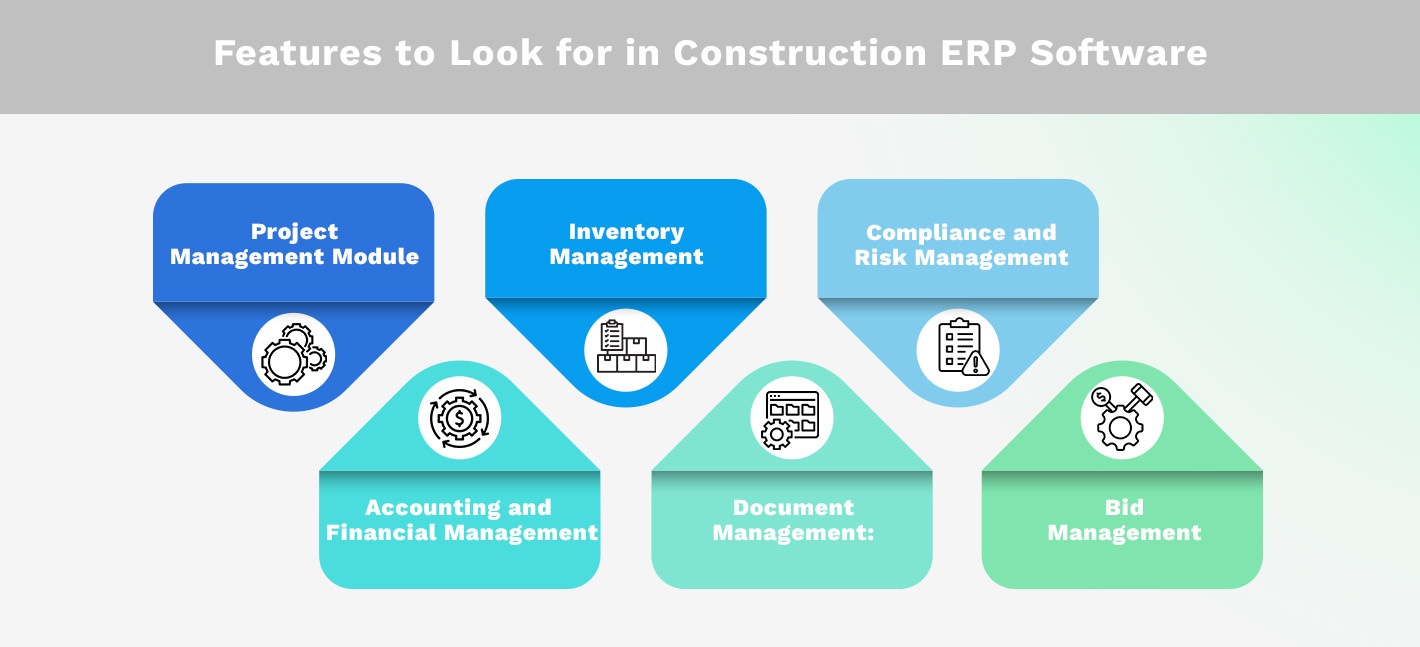
Unique Features that Improve ERP System Performance
Some unique features differentiate top-notch construction ERP systems from the ordinary. Here's what to look for:
- Mobile Capability: With workers often spread across multiple job sites, the ability of an ERP to offer mobile access is essential. Get real-time updates, make on-the-spot decisions, and streamline your workflow, all in the palm of your hand.
- CRM and HR Management: Integrated Customer Relationship Management (CRM) and Human Resources Management (HRM) modules can simplify and improve how you manage your customer relationships and your employees, respectively.
- CAD Interface: An ERP system that can integrate with CAD software is a significant advantage. This allows for seamless communication between design teams and the rest of the project staff, improving project quality and efficiency.
- Logistics and Transport Management: This feature can aid in organizing the delivery of materials and machinery onsite, helping to reduce errors and keep the project moving smoothly.
- Complex Workforce Management: Some ERP systems include tools to manage collective bargaining agreements, payroll, taxes, and other workforce complexities. This feature can be a boon for construction companies employing diverse and dispersed workforces.
- Industry 4.0 Ready: Systems that are future-ready or designed with Industry 4.0 technologies, like IoT, AI, and Machine Learning, will undoubtedly belong to the next-generation category of ERP systems.
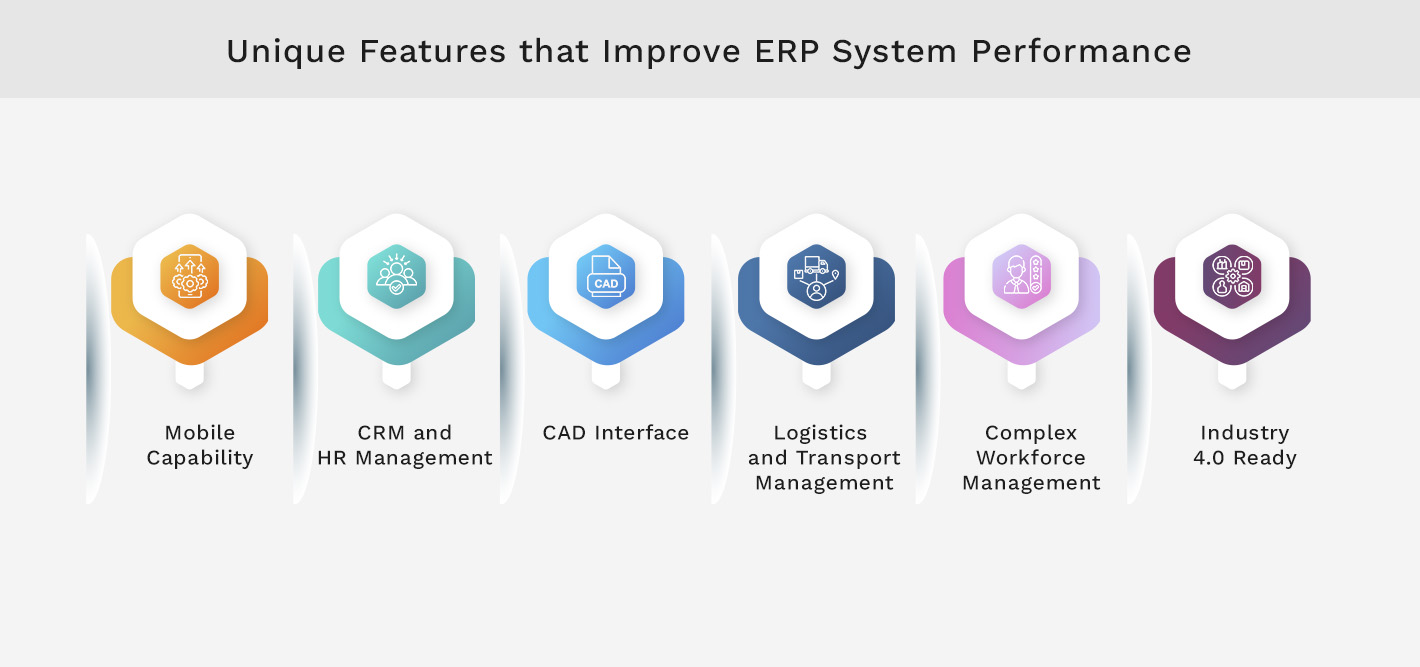
How to Choose the Best Construction ERP Software for Your Business?
Choosing an ERP system for your construction company is a significant decision that can largely impact your company's efficiency and profitability. But with so many options available, how do you pick the right one? Consider the following steps:
Outline Your Specific Requirements
Before you start your search, define what you expect from the software. List down the specific challenges you wish to address and the functionalities you require. This process will guide you toward the ERP system that best suits your needs.
Examine the Vendor's Reputation
Look for vendors with a strong construction industry track record. Check reviews and case studies about their software and their level of customer support. A reputable vendor can make a comprehensive system even more valuable.
Scalability
As companies grow, so do their management needs. Your chosen software should be able to scale with your growth. Check whether the ERP system can handle larger projects, more users, or new functionality over time.
Price vs. Value
Lower cost doesn't always mean better value. Consider the return on investment you will get from the system. An ERP system that provides more features, efficiency, and reliability might be more expensive initially but provides better value over time.
Integration
The ability to integrate with existing software tools in your workflow contributes to a seamless operation within the organization.
User Experience
An ERP system with a complicated user interface can create resistance among your team. Ensure the solution you choose is user-friendly and offers proper training to help your team adapt to the platform.
Look into the Future of Construction ERP with Kohezion
The future of construction ERP is one of constant change and rapid growth. Technologies previously in their infancy are now becoming industry standards, and companies are continuously looking for solutions that can help them gain a competitive edge.
The right ERP software will depend on your organization's specific needs and strategic goals. With Kohezion, you can take the first step into the future of construction ERP.
Conclusion
Selecting the best ERP software for your construction business is vital for streamlining operations and improving efficiency. The top 11 solutions listed here offer robust features and capabilities to meet the diverse needs of the construction industry in 2024. Each system provides unique benefits, so carefully consider your specific requirements before making a decision.
For more information or to see how Kohezion can support your ERP needs, contact us today.
Start building with a free account
Frequently Asked Questions
Yes, an ERP system can help with regulatory compliance by providing tools to track and manage compliance-related activities, generate necessary reports, and ensure adherence to industry standards and regulations.
The implementation time for an ERP system varies depending on the complexity of the business processes and the system itself. It can range from a few months to over a year. Proper planning and phased implementation can help streamline the process.
Training requirements depend on the system's complexity and the users' familiarity with similar tools. Typically, employees will need training on navigation, data entry, report generation, and using specific modules relevant to their roles.
The costs associated with implementing an ERP system include software licensing fees, hardware requirements, implementation and customization costs, training expenses, and ongoing maintenance and support fees. These costs vary widely depending on the system and the company's size.
To measure the ROI of an ERP system, track key performance indicators such as increased efficiency, reduced operational costs, improved project timelines, and improved data accuracy. Compare these metrics before and after implementation to evaluate the system's impact on your business.

